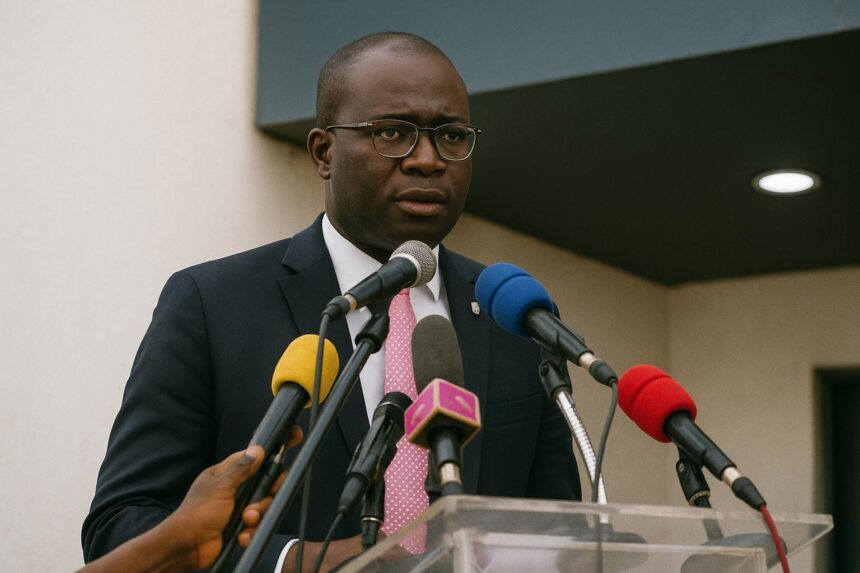72-hour business launch
From buzzing hairdressers in Mfilou to tech coders in Pointe-Noire, Congolese dreamers share a new countdown: 72 hours. That is the time the Congolese Agency for Business Creation, ACPCE, promises between the first form and the official licence, turning bureaucracy into sprint.
Created by law 16-2017 and placed under the Ministry of Small and Medium Enterprises led by Minister Jacqueline Lydia Mikolo, the agency embodies the presidential pledge to ease market entry and widen employment opportunities for a youthful population whose median age barely reaches twenty.
An agency born from reform
Director General Emeriand Dieu-Merci Kibangou, appointed on 15 February 2022, tells us the institution simply ‘exorcised’ company registration. One stop, one set of documents, one small fee: that is the updated ritual replacing the old pilgrimage through scattered offices and, once upon a time, security clearances.
Entrepreneurs today bring three items: a national identity card, a lease agreement, and 25,000 CFA francs, four times cheaper than the former tariff. ACPCE receives, checks, stamps and delivers a single exploitation licence that doubles as fiscal, social and statistical identification.
Inside the 72-hour journey
The promise is bold, yet the clock is real. From the Brazzaville headquarters on Avenue Émile Biayenda, staff stamp incoming files before noon. By the third sunset, entrepreneurs walk out with the precious certificate, often applauded by others waiting in the bright, orange-painted lobby.
To widen reach, satellites opened in Pointe-Noire, Dolisie, Nkayi, Owando and Ouesso, cutting hours of road or river travel for provincial founders. The network already hosts digital kiosks where fingerprints, tax codes and social security numbers are assigned in minutes, according to ACPCE technicians.
Numbers behind the registry
The central database now lists about 35,000 active registrations, a shade more than the 10,000 businesses followed by the tax administration and far above the 4,900 counted by the National Institute of Statistics. Kibangou sees full digitisation as the bridge that will align those numbers.
Classification also matters. Congolese law splits companies by turnover: micro up to 25 million CFA, small to 100 million, medium below two billion, large beyond. Wrongly declaring size can deprive the Treasury of revenue and, paradoxically, deny owners the incentives reserved for smaller players.
Women and youth drive growth
Women increasingly claim their space. In 2024, ACPCE records show 26.2 percent of new firms led by women nationwide, peaking at 28.4 percent in Pool Department. Observers credit easier paperwork and targeted outreach sessions hosted in churches, markets and university campuses.
Youth remain the headline. Under the ‘One Youth, One Enterprise’ initiative launched this year with UNDP backing, 2,579 young founders already received training, coaching or seed money, an envelope estimated between three and five billion CFA francs, officials report.
Jean-Patrick, 25, left the banking queue to wp-signup.php his design studio. ‘I filled the form on Wednesday and got my licence on Friday. My parents could not believe there was no extra signature to chase,’ he laughs, flipping the laminated paper that now hangs above his desk.
Tracking life after launch
Behind the smiles, survival remains the real exam. ACPCE owns the ‘birth certificates’ of every firm, yet few request ‘death certificates’ when activity stops. The absence of mandatory closure procedures prevents accurate failure rates, complicating policy design and investors’ risk assessments.
Kibangou says a new digital dashboard, now in testing, will nudge dormant owners to declare closure or restart. ‘We want complete life-cycle data; that is how you build reliable credit scores and value chains,’ he explains, emphasising the agency’s cooperative approach with chambers of commerce.
Building a supportive ecosystem
Economists argue the 72-hour window must pair with affordable credit and infrastructure to unleash full impact. Microfinance institutions are piloting fast-track accounts linked to the ACPCE registry, while fibre-optic expansion, supported by the government’s digital plan, targets smaller cities hungry for e-commerce.
For now, the message is clear: no more labyrinth. Three days can change a destiny. Kibangou ends each public intervention the same way: ‘Every Congolese has the right to risk, to create, to succeed.’ In the bustling lobby, the countdown on wall screens restarts every morning.
Tax officers in Brazzaville note that the licence’s QR code now feeds directly into the e-impôt platform, reducing manual transcription errors. This integration, they say, should gradually expand the taxpayer base and allow more precise forecasting of non-oil revenues during budget sessions.
Meanwhile, universities are embedding short modules on ACPCE procedures into entrepreneurship courses. Lecturer Clarisse Ngatsé argues that demystifying legal steps early prevents talent drain. ‘Our graduates see opportunity at home, not only in Kigali or Abidjan,’ she insists after a crowded workshop at Marien-Ngouabi University.
How to join the countdown
Aspiring founders can visit acpce.cg or walk into the nearest branch with their papers before noon any weekday. If the file is complete, the 72-hour promise starts at that minute. And on Day Three, a new line is added to the growing national business ledger.






















